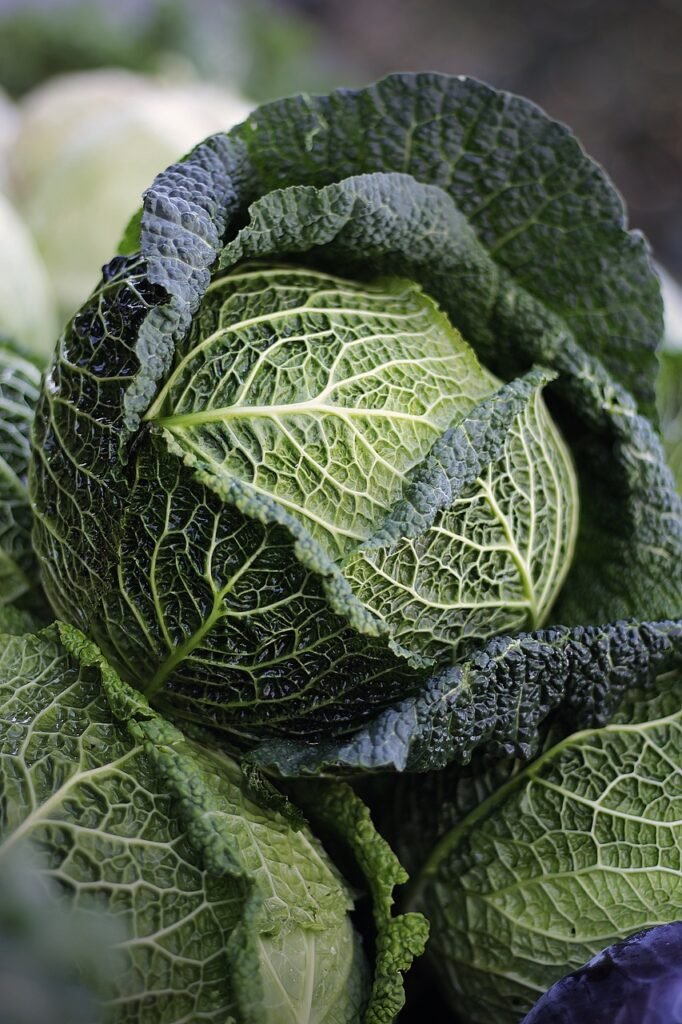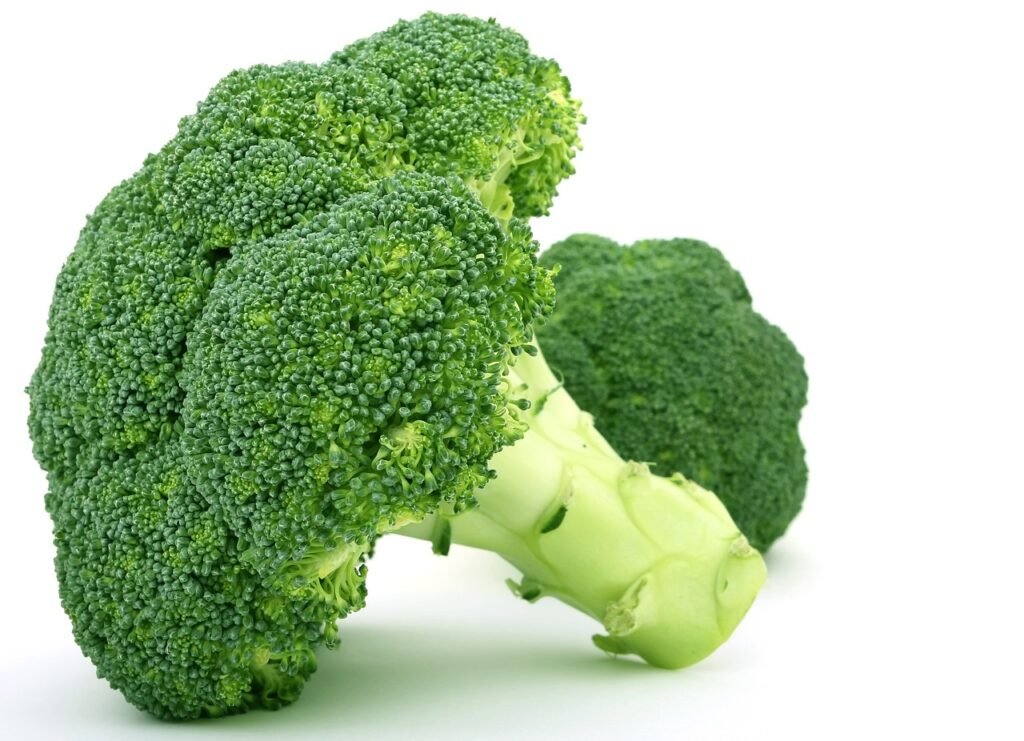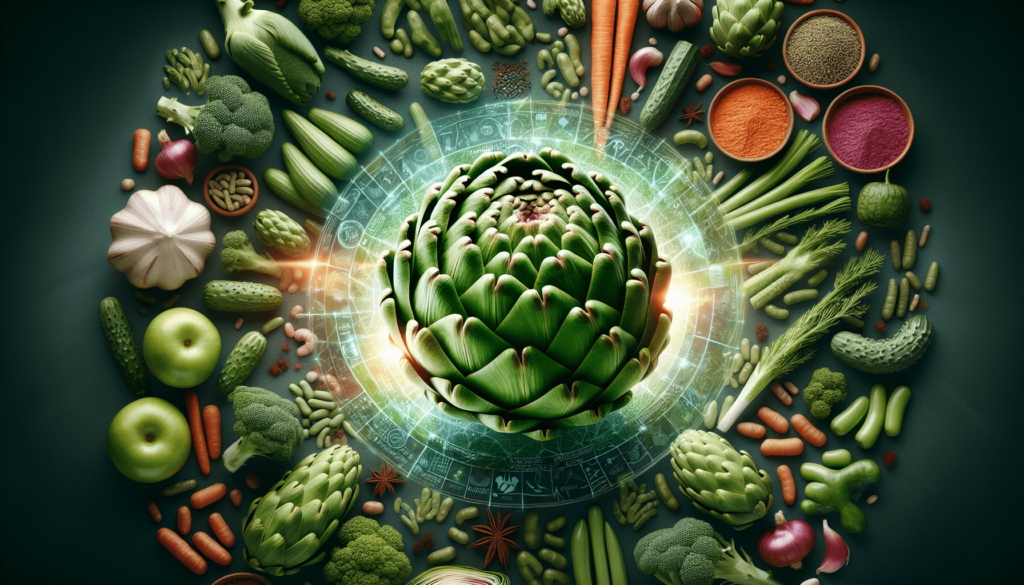Imagine you have experienced digestive issues, and you’re desperately searching for a simple solution that doesn’t involve medicine or complicated diets. Look no further than your kitchen! In this article, we will explore the world of prebiotic fibers and discover which vegetables are bursting with these gut-loving compounds. By incorporating these vegetables into your diet, you can nourish and support your gut bacteria, leading to improved digestion and overall wellness. So grab a pen and paper, because after reading this, you’ll want to make a grocery list for your next trip to the supermarket!
Artichokes
Introduction to Artichokes
Artichokes are a unique and delicious vegetable that have been enjoyed for centuries. With their vibrant green color and distinctive shape, artichokes are not only visually appealing but also offer a wealth of nutritional benefits. Whether you’re a culinary enthusiast or simply looking to improve your overall health, incorporating artichokes into your diet is a fantastic way to do so.
Nutritional Profile
Artichokes are packed with essential vitamins, minerals, and antioxidants that contribute to a healthy diet. They are an excellent source of fiber, vitamin C, vitamin K, folate, and magnesium. Artichokes also contain beneficial compounds such as cynarin, which has been shown to have hepatoprotective properties, supporting liver health.
Health Benefits of Artichokes
Artichokes offer numerous health benefits that make them a valuable addition to any diet. Their high fiber content helps promote healthy digestion and prevents constipation. Additionally, artichokes are known to support liver function and may aid in detoxification processes. They are rich in antioxidants, which play a key role in protecting our cells from oxidative stress and reducing the risk of chronic diseases.
Prebiotic Fibers in Artichokes
One of the standout features of artichokes is their abundance of prebiotic fibers. Prebiotics are non-digestible carbohydrates that serve as fuel for beneficial gut bacteria. By nourishing these beneficial bacteria, prebiotics help maintain a balanced gut microbiota, which is crucial for digestive health and overall well-being.
Impact on Gut Bacteria
Studies have shown that artichokes contain specific prebiotic fibers, such as inulin and fructooligosaccharides (FOS), that have a positive impact on gut bacteria. These fibers act as a food source for the beneficial bacteria in our intestines, promoting their growth and enhancing their ability to produce essential nutrients. A healthy gut microbiota has been linked to improved immune function, reduced inflammation, and better mental health.
Incorporating Artichokes into Your Diet
Incorporating artichokes into your diet is easy and enjoyable. They can be steamed, grilled, roasted, or even eaten raw in salads. One popular way to enjoy artichokes is by boiling them and then pulling off the individual leaves to dip in a flavorful sauce. As you progress towards the center, you’ll find the prized heart, which can be eaten in its entirety. Artichokes also make a delicious addition to pizzas, pasta dishes, and vegetable soups.
Asparagus
Introduction to Asparagus
When it comes to vibrant and nutritious vegetables, asparagus is at the top of the list. Known for its distinct taste and slender shape, asparagus has been enjoyed for its culinary and health benefits for centuries. Adding asparagus to your diet not only brings a burst of flavor but also contributes to overall well-being.
Nutritional Profile
Asparagus is a nutrient-dense vegetable that is low in calories but high in vitamins and minerals. It contains high levels of vitamins A, C, E, and K, as well as folate and fiber. Asparagus is also a rich source of antioxidants such as glutathione, which has been shown to have potent anti-inflammatory and anti-cancer properties.
Health Benefits of Asparagus
The health benefits of asparagus are extensive. It is a natural diuretic, aiding in flushing out toxins from the body and promoting healthy kidney function. Asparagus is also known to support cardiovascular health by lowering blood pressure, reducing inflammation, and improving blood lipid profiles. Additionally, its high fiber content helps promote regularity and prevent constipation.
Prebiotic Fibers in Asparagus
Asparagus contains prebiotic fibers, such as inulin, oligofructose, and fructooligosaccharides (FOS), which are known to have a positive impact on gut bacteria. These prebiotics selectively stimulate the growth and activity of beneficial bacteria in the gut, leading to a healthier and more balanced microbiota. This, in turn, can support digestion, enhance immune function, and contribute to overall gut health.
Impact on Gut Bacteria
Studies have shown that consuming asparagus can lead to increased populations of beneficial bacteria, such as Bifidobacterium and Lactobacillus, in the gut. These bacteria play important roles in maintaining gut health, preventing the overgrowth of harmful bacteria, and promoting the synthesis of essential nutrients. A well-balanced gut microbiota is essential for overall health and has been linked to a reduced risk of various diseases.
Incorporating Asparagus into Your Diet
There are numerous delicious ways to incorporate asparagus into your diet. It can be roasted, grilled, steamed, or sautéed as a side dish or added to stir-fries, salads, and pasta dishes. Asparagus is also a fantastic addition to omelets, quiches, and frittatas. Its unique flavor complements a variety of ingredients, making it a versatile and nutritious vegetable to enjoy year-round.

This image is property of pixabay.com.
Garlic
Introduction to Garlic
Garlic, an aromatic bulb related to the onion family, has been used for centuries for its culinary and medicinal properties. Whether you’re cooking up a flavorful dish or looking to support your overall health, garlic is a versatile and valuable addition to your kitchen.
Nutritional Profile
Garlic is low in calories but packed with essential nutrients. It is an excellent source of vitamin C, vitamin B6, manganese, and selenium. Garlic also contains small amounts of calcium, potassium, iron, and zinc. Additionally, it is rich in sulfur compounds, including allicin, which is responsible for many of its health benefits.
Health Benefits of Garlic
The health benefits of garlic are well-documented. It has potent antioxidant, antimicrobial, and anti-inflammatory properties that can help protect against various diseases. Garlic has been shown to support cardiovascular health by lowering cholesterol levels, reducing blood pressure, and improving blood clotting. It may also enhance immune function, promote detoxification, and support bone health.
Prebiotic Fibers in Garlic
Garlic contains fructans, a type of prebiotic fiber that acts as a food source for beneficial gut bacteria. These fibers pass undigested through the upper gastrointestinal tract and reach the colon, where they are fermented by gut bacteria. This fermentation process produces short-chain fatty acids (SCFAs), which provide energy for the colon cells and have numerous health benefits.
Impact on Gut Bacteria
Consuming garlic has been shown to positively influence the composition of the gut microbiota. It stimulates the growth of beneficial bacteria such as Bifidobacterium and Lactobacillus, which play important roles in maintaining gut health and overall well-being. A healthy gut microbiota promotes digestion, strengthens the immune system, and reduces the risk of chronic diseases.
Incorporating Garlic into Your Diet
Garlic can add a delicious and aromatic touch to a wide range of dishes. It can be used in marinades, sauces, dressings, soups, and stews, enhancing the flavor profile of any recipe. Crushed or minced garlic can be sautéed in olive oil for a fragrant base, or roasted for a milder and sweeter taste. It pairs well with meats, vegetables, pasta, and grains, making it a versatile ingredient in your kitchen.
Onions
Introduction to Onions
Onions are a staple ingredient in many cuisines around the world, known for their distinct flavor and aroma. Whether sautéed, caramelized, or consumed raw, onions add depth and character to a wide variety of dishes. Beyond their culinary value, onions also offer numerous health benefits that make them a valuable addition to any diet.
Nutritional Profile
Onions are low in calories but rich in essential nutrients. They are a good source of vitamin C, vitamin B6, potassium, and dietary fiber. Onions also contain antioxidant compounds, such as quercetin, which contribute to their health-promoting properties. Additionally, they are low in fat and cholesterol, making them a healthy vegetable choice.
Health Benefits of Onions
Onions offer a range of health benefits due to their unique blend of phytochemicals. They possess anti-inflammatory, antimicrobial, and antioxidant properties that can help protect against chronic diseases. Onions have been shown to support cardiovascular health by reducing blood pressure, improving lipid profiles, and preventing clot formation. They may also have anticancer properties and contribute to bone health.
Prebiotic Fibers in Onions
Onions are a rich source of prebiotic fibers, particularly the fructooligosaccharides (FOS) called fructans. These fibers are resistant to digestion in the small intestine and reach the colon intact, where they serve as food for beneficial gut bacteria. By nourishing these bacteria, onions promote a healthy gut microbiota and support overall digestive health.
Impact on Gut Bacteria
Research has shown that onion consumption can positively influence the gut microbiota composition. The prebiotic fibers in onions stimulate the growth of beneficial bacteria and inhibit the growth of harmful bacteria, promoting gut health. A balanced and diverse gut microbiota is associated with improved digestion, enhanced immune function, and reduced risk of disease.
Incorporating Onions into Your Diet
Onions can be incorporated into your diet in numerous delicious ways. They are a versatile ingredient that can be used in almost any savory dish, from soups and stews to stir-fries and salads. Sautéed onions make a flavorful base for many recipes, adding depth and complexity to the final dish. Raw onions can be used in salsas and sandwiches for a refreshing crunch. Experiment with different varieties of onions, such as red, white, or shallots, to explore their unique flavors and textures.

This image is property of pixabay.com.
Leeks
Introduction to Leeks
Leeks, with their mild and onion-like flavor, are a versatile and nutritious vegetable often underappreciated in the culinary world. Native to Europe and the Mediterranean, leeks have been enjoyed for their unique taste and health benefits for centuries. Incorporating leeks into your diet not only adds depth and complexity to your dishes but also provides a range of essential nutrients.
Nutritional Profile
Leeks are low in calories but rich in important nutrients. They are an excellent source of vitamin K, vitamin C, vitamin A, and dietary fiber. Leeks also contain minerals such as manganese, iron, and folate. Additionally, they are a source of flavonoids, which possess antioxidant and anti-inflammatory properties.
Health Benefits of Leeks
The health benefits of leeks are diverse and impressive. They are known to support heart health by reducing cholesterol levels and blood pressure. Leeks may also have anticancer properties due to their content of flavonoids and sulfur compounds. Their high fiber content promotes healthy digestion and prevents constipation. Furthermore, leeks contain beneficial compounds that support immune function and contribute to overall well-being.
Prebiotic Fibers in Leeks
Leeks are rich in prebiotic fibers called oligofructose and inulin. These fibers pass undigested through the upper gastrointestinal tract and reach the colon, where they are fermented by gut bacteria. The fermentation process produces short-chain fatty acids (SCFAs), which provide energy for the colon cells and have numerous health benefits.
Impact on Gut Bacteria
Consuming leeks can have a positive impact on the composition of the gut microbiota. The prebiotic fibers in leeks selectively stimulate the growth and activity of beneficial bacteria, leading to a healthier and more diverse gut microbiota. This can support digestion, enhance immune function, and reduce the risk of various diseases.
Incorporating Leeks into Your Diet
Leeks can be prepared in various ways, depending on personal preference and the culinary dish. They can be sliced and sautéed as a flavorful addition to soups, stews, and stir-fries. Leeks can also be used as a milder substitute for onions in recipes, adding a subtle and delicate flavor. Additionally, they can be braised, roasted, or grilled as a side dish or incorporated into salads for a refreshing crunch. Leeks are a versatile vegetable that can elevate the taste and nutritional value of your meals.
Chicory Root
Introduction to Chicory Root
Chicory root, derived from the blue-flowered chicory plant, is a versatile and underutilized ingredient with a wealth of health benefits. Widely consumed as a coffee substitute or additive, chicory root also offers numerous advantages when incorporated into various culinary dishes. Explore the unique flavors and benefits of chicory root, and discover why it’s worth considering for your diet.
Nutritional Profile
Chicory root is rich in essential vitamins and minerals, making it a valuable addition to a balanced diet. It contains significant amounts of vitamin C, vitamin B6, potassium, calcium, and manganese. Chicory root is also known for its high fiber content, which supports healthy digestion and regular bowel movements.
Health Benefits of Chicory Root
Chicory root offers a range of health benefits due to its unique composition of compounds. It is rich in antioxidants, which help protect against cellular damage caused by free radicals. The soluble fibers present in chicory root may help regulate blood sugar levels, promote satiety, and support weight management. Additionally, chicory root has been linked to improved gut health, reduced inflammation, and enhanced liver function.
Prebiotic Fibers in Chicory Root
One of the most significant advantages of chicory root is its high content of prebiotic fibers, particularly inulin and fructooligosaccharides (FOS). These fibers are non-digestible by human enzymes and instead serve as fuel for beneficial gut bacteria. By nourishing these bacteria, chicory root helps maintain a healthy and diverse gut microbiota, contributing to overall digestive health and well-being.
Impact on Gut Bacteria
Research has demonstrated that consuming chicory root promotes the growth of beneficial bacteria in the gut, such as Bifidobacterium and Lactobacillus. These bacteria play crucial roles in maintaining gut health, preventing the overgrowth of harmful bacteria, and supporting nutrient absorption. A balanced and diverse gut microbiota has been associated with improved digestion, enhanced immune function, and reduced risk of various diseases.
Incorporating Chicory Root into Your Diet
Chicory root can be enjoyed in various forms and culinary creations. It is commonly used as a coffee substitute or additive, providing a rich and earthy flavor reminiscent of traditional coffee. Chicory root can also be incorporated into baked goods, such as bread or muffins, to add a subtle sweetness and increase fiber content. Additionally, it can be used as a natural sweetener or thickener in sauces and dressings. Experimenting with chicory root allows you to explore new flavors while reaping the nutritional benefits it offers.

This image is property of pixabay.com.
Jerusalem Artichokes
Introduction to Jerusalem Artichokes
Jerusalem artichokes, also known as sunchokes, are a unique and versatile root vegetable that deserves a spot in your kitchen. Despite their name, they are not related to artichokes but are part of the sunflower family. Jerusalem artichokes offer a range of culinary possibilities and nutritional benefits that make them a fantastic addition to any diet.
Nutritional Profile
Jerusalem artichokes are a nutritional powerhouse, offering a wide array of essential vitamins and minerals. They are an excellent source of potassium, phosphorus, iron, and thiamine (vitamin B1). Jerusalem artichokes are also rich in dietary fiber, particularly inulin, a prebiotic fiber. Additionally, they contain antioxidants that contribute to their health-promoting properties.
Health Benefits of Jerusalem Artichokes
Incorporating Jerusalem artichokes into your diet can have various health benefits. The high fiber content supports healthy digestion and helps prevent constipation. Jerusalem artichokes may aid in blood sugar control due to their low glycemic index and potential insulin-regulating properties. They also offer cardiovascular support, promote weight management, and contribute to improved immune function.
Prebiotic Fibers in Jerusalem Artichokes
Jerusalem artichokes are renowned for their high content of inulin, a type of prebiotic fiber. Inulin acts as a food source for beneficial gut bacteria, stimulating their growth and activity. By promoting a healthy balance of gut microbiota, inulin contributes to improved digestion, enhanced nutrient absorption, and overall gut health.
Impact on Gut Bacteria
Studies have shown that consuming Jerusalem artichokes can lead to a significant increase in beneficial bacteria, such as Bifidobacterium and Lactobacillus, in the gut. These bacteria are known to play crucial roles in maintaining gastrointestinal health, supporting immune function, and preventing the colonization of harmful bacteria. A diverse and balanced gut microbiota is associated with improved overall health and reduced risk of various diseases.
Incorporating Jerusalem Artichokes into Your Diet
Jerusalem artichokes can be prepared and enjoyed in many delicious ways. They can be roasted, steamed, sautéed, or even consumed raw in salads. Their earthy and slightly sweet flavor pairs well with a variety of ingredients, making them a versatile addition to various dishes. Jerusalem artichokes can be added to soups, stir-fries, gratins, or purees to bring a unique twist. Get creative and experiment with different cooking methods to discover your favorite way to enjoy this nutritious vegetable.
Dandelion Greens
Introduction to Dandelion Greens
Dandelion greens, often considered a weed, are actually a highly nutritious and versatile vegetable that deserves more recognition. These vibrant leaves, traditionally used in herbal medicine, offer a range of culinary possibilities and health benefits. Discover the value of incorporating dandelion greens into your diet and elevate your meals with their unique flavor and nutrition.
Nutritional Profile
Dandelion greens are a nutrient powerhouse, packed with essential vitamins and minerals. They are particularly high in vitamin A, vitamin C, and vitamin K. Dandelion greens also provide beneficial compounds such as antioxidants, phytonutrients, and dietary fiber. Additionally, they contain minerals like iron, calcium, magnesium, and potassium.
Health Benefits of Dandelion Greens
Incorporating dandelion greens into your diet can support overall health and well-being. They possess strong antioxidant properties, helping to protect against oxidative stress and chronic diseases. Dandelion greens are known to support liver health by stimulating bile production and improving liver function. They may also aid digestion, promote healthy weight management, and boost immune function.
Prebiotic Fibers in Dandelion Greens
Dandelion greens contain inulin, a prebiotic fiber that serves as a fuel source for beneficial gut bacteria. By nourishing these bacteria, inulin promotes a healthy gut microbiota, contributing to improved digestion, enhanced nutrient absorption, and overall gut health. Prebiotic fibers have also been associated with reduced inflammation and improved immune function.
Impact on Gut Bacteria
Research has shown that consuming dandelion greens can positively influence the composition of the gut microbiota. The prebiotic fibers in dandelion greens selectively stimulate the growth and activity of beneficial bacteria while inhibiting the growth of harmful bacteria. This promotes a diverse and balanced gut microbiota, which has been linked to improved digestion, enhanced immune function, and reduced risk of various diseases.
Incorporating Dandelion Greens into Your Diet
Dandelion greens can be enjoyed in a variety of tasty and nutritious ways. They can be eaten raw in salads, providing a slightly bitter and peppery flavor. Dandelion greens can also be sautéed, steamed, or added to soups, stews, and stir-fries. They make a fantastic addition to omelets, quiches, and frittatas, adding a unique twist to traditional recipes. Experiment with different cooking methods to find your preferred way to incorporate dandelion greens into your meals.

Jicama
Introduction to Jicama
Jicama, pronounced “hee-ka-ma,” is a root vegetable native to Mexico and a popular ingredient in Latin American cuisines. With its unique flavor and refreshing crunch, jicama offers a delightful addition to various dishes. Whether enjoyed raw, cooked, or incorporated into salads and stir-fries, jicama provides numerous health benefits and culinary possibilities.
Nutritional Profile
Jicama is low in calories but rich in essential nutrients. It is an excellent source of vitamin C, potassium, and dietary fiber. Jicama also contains significant amounts of antioxidants, such as vitamin E and various phenolic compounds. This root vegetable is low in carbohydrates and high in water content, contributing to its hydrating properties.
Health Benefits of Jicama
Incorporating jicama into your diet can support overall health and well-being. Its high vitamin C content helps boost immune function and collagen production. Jicama is also rich in antioxidants, which can help protect against cellular damage caused by free radicals. Additionally, the dietary fiber in jicama promotes healthy digestion, supports weight management, and contributes to improved gut health.
Prebiotic Fibers in Jicama
Jicama contains prebiotic fibers, such as oligofructose and inulin, which serve as food for beneficial gut bacteria. By nourishing these bacteria, jicama promotes a healthy and diverse gut microbiota. This, in turn, enhances digestion, improves nutrient absorption, and supports overall gut health. Prebiotic fibers have also been associated with reduced inflammation and enhanced immune function.
Impact on Gut Bacteria
Consuming jicama can positively impact the composition of the gut microbiota. The prebiotic fibers in jicama selectively stimulate the growth and activity of beneficial bacteria, while inhibiting the growth of harmful bacteria. Maintaining a balanced and diverse gut microbiota is key to digestion, immune function, and overall well-being.
Incorporating Jicama into Your Diet
There are numerous ways to enjoy the crisp and refreshing taste of jicama. It can be peeled and sliced into sticks for a healthy, low-calorie snack. Jicama is a fantastic addition to salads, adding a satisfying crunch and subtle sweetness. It can also be used in stir-fries, slaws, or salsas for a refreshing twist. Get creative and experiment with jicama in your favorite dishes to experience its unique flavor and nutritional benefits.
Bananas
Introduction to Bananas
Bananas are one of the most widely consumed fruits worldwide, cherished for their natural sweetness and convenience. Whether eaten on their own, added to smoothies, or incorporated into baked goods, bananas offer a range of health benefits and culinary possibilities. Discover the nutritional value and versatility of this beloved fruit and why it should have a regular place in your diet.
Nutritional Profile
Bananas are a nutritional powerhouse, packed with essential vitamins, minerals, and dietary fiber. They are an excellent source of vitamin C and vitamin B6, and also provide potassium, manganese, and magnesium. Bananas are rich in carbohydrates, particularly natural sugars, making them a quick and energizing snack option.
Health Benefits of Bananas
Incorporating bananas into your diet can support overall health and well-being. They are known for their energy-boosting properties, thanks to the natural sugars and carbohydrates they contain. Bananas are rich in antioxidants, which help protect against oxidative stress and cell damage. They also support healthy digestion, promote heart health, and contribute to improved mood and mental well-being.
Prebiotic Fibers in Bananas
Bananas contain resistant starch, a type of prebiotic fiber that is not digested in the small intestine but reaches the colon intact. In the colon, resistant starch serves as food for beneficial gut bacteria, promoting their growth and activity. This, in turn, supports a healthy gut microbiota and contributes to improved digestion, enhanced immune function, and overall gut health.
Impact on Gut Bacteria
Studies have shown that consuming bananas can positively influence the composition of the gut microbiota. The prebiotic fibers in bananas selectively stimulate the growth and activity of beneficial bacteria, leading to a healthier and more diverse gut microbiota. This balance of gut bacteria has been associated with improved digestion, enhanced nutrient absorption, and reduced risk of various diseases.
Incorporating Bananas into Your Diet
Bananas are incredibly versatile and can be enjoyed in numerous ways. They are a convenient and portable snack option, perfect for on-the-go nutrition. Bananas can be sliced and added to breakfast cereals, yogurt, or oatmeal to add natural sweetness and creaminess. They are a popular ingredient in smoothies, helping to thicken and sweeten these nutritious beverages. Bananas can also be used in baking, adding moisture and natural sweetness to muffins, bread, and cakes. Get creative and add bananas to your favorite recipes to enjoy their delicious flavor and range of health benefits.
In conclusion, incorporating these vegetables into your diet can provide a range of health benefits, particularly due to their high content of prebiotic fibers that promote a healthy gut microbiota. Artichokes, asparagus, garlic, onions, leeks, chicory root, Jerusalem artichokes, dandelion greens, jicama, and bananas each bring their unique flavors, textures, and nutrients. Whether you enjoy them raw, cooked, or incorporated into various dishes, these vegetables can greatly contribute to your overall well-being. So, get creative in the kitchen and start reaping the benefits of these prebiotic-rich vegetables today!


